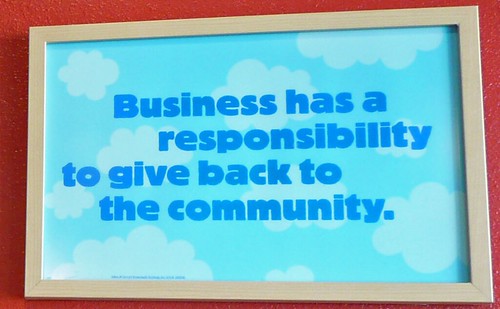Don't view 2% CSR spend as a spend - view it as a core business strategy
/
Do you think of the recent Companies Bill in India mandating companies of certain size to spend 2% of their net profits on CSR (Corporate Social Responsibility) activities will bring higher transparency, efficiency and responsibility among the Indian businesses?
While there is some merit in this bill, it will not change the business models. It will not reinvent capitalism. Before we look at why I think it should not be viewed as a spend, let's first quickly look at 4 top-of-the-head pros and cons about the bill:
Pros:
- Growth in the CSR field - need for professionals etc.
- Forcing legislation can bring about innovative ideas in CSR
- A more structured approach to social initiatives
- Gives a roadmap for companies that would join the circle in future
Cons:
- Can be seen as a mere tickmark exercise
- Forcing legislation can be a put-off for companies that are already doing their part in the CSR area
- Increased Greenwashing - Tainted companies can make themselves can come clean and look good
- Unsustainable in the long run - keeps the same business model (for example Oil companies will keep producing more oil instead of being encouraged to look for profits in renewable sources of energy)
Not a spend but a business strategy
I think spending funds from profits (be it on CSR or whatever) should be a company's prerogative. In a way, the bill penalizes the companies to be in business and that's why we see companies now lobbying intensly for tax incentives on the 2% spend on CSR acitivties (especially when the corporates believe CSR to be bullshit). Indian Government is still quite dinosaouric in their CSRish stance. Companies with soul have already been doing it for a long time (Tata, Mahindra, Marico etc.)
Also readValue creation and good Corporate Governance
Rather, to encourage responsible behavior, companies should be given reasons to conduct ecosystem evaluation and the benefits from tying business strategy to creating shared value via CSR or other activities. Show them the carrot of doing well by doing good by "providing enabling conditions" for the companies to bring change that government wants to see.
And now that the bill is passed, least the media can do is to not view it as a "spend" - it ought to be viewed as a core business strategy. It should be viewed as a platform to move towards CSV and sustainability. I was dissappointed to see the mainstream news sites calling it as a "spend" (they do show different ways to utilize the money, but they do not get to the root). The world is already moving from CSR to CSV (Creating Shared Value).
The works of Michael Porter and Mark Kramer are being adopted by various companies which are reinventing their business models serving both the society and business interests - thus creating societal value along with shareholder value. CSR, in its old form has been discretionary and is separate from profit maximization, mostly viewed as an add-on with a limited budget (some even call it Image facelift). CSV is integral to profit maximization and is a joint community and company value creation.
Transforming business models
We need transformational business models by developing new products and by capturing new income streams. John Elkington talks about break-through capitalism. Phrases like Conscious Capitalism and Compassionate Capitalism are becoming part of the new voacabulary and the Indian government is still stuck at forcing CSR on Indian companies. Any change expected from businesses must make pure business sense (the only incentive to venture into new activity).
I think Corporation 2020, the new book by Pavan Sukhdev should be made a must read - both by those in the government and by the company board members and CEO.
Nowhere Pavan mentions that companies should be forced into spending their profits. What he does allude to is these 4 points that:
- a company's goals must be aligned with those of society
- a company must be viewed as a Capital factory (not just goods & services one)
- a company's role as a community and
- a company as an institute of learning
If companies of all sizes - irrespective of their profits, start to weave these 4 strands into the fabric of their business models, some real tangible long lasting sustainble changes will happen - which are good for the businesses as well as enviroment and the society at large (core precept of the triple bottomline)
The media shapes public opinion. It also influences business stance. I think if this bill is viewed as an investment and as a core strategy, something that adds value to their bottomline and not subtracts value, the legislation would have some positive effect among the Indian businesses (though it doesn't refute the fact that the bill is short-sighted).
Related reads:
- Book review: Corporation 2020 by Pavan Sukhdev
- Why Pavan Sukhdev thinks the mandatory 2% CSR spend is short-sighted
- Value creation and good Corporate Governance
- How to Reinvent Capitalism via Creating Shared Value?
- Promoting Corporate Responsibility
- Corporate Governance for Sustainability
(Image fromhttp://www.flickr.com/photos/67945918@N00/3231329018)


